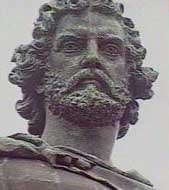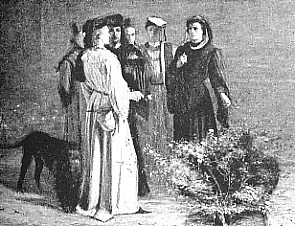Britain in the Middle Ages
|
|
| History of Britain |
| Chronological |
| Prehistoric Britain |
| Roman Britain |
| Sub-Roman Britain |
| MediŠval Britain |
| Early Modern Britain |
| Modern Britain |
| Geographic |
| History of England |
| History of Ireland |
| History of Scotland |
| History of Wales |
| Topical |
| Economic history |
| British Empire |
| Military history |
| Social history |
| Constitutional history |
| edit (http://en.wikipedia.org/w/wiki.phtml?title=Template:UKHBS&action=submit) |
"Medi´┐Żval Britain" is a term used to suggest that there is a unity to the history of Great Britain from the 5th century's withdrawal of Roman forces and Germanic invasions until the 16th century Reformations in Scotland and England. Major historical events in Medi´┐Żval British history include the Christianisation of England and Scotland, the Norman Conquest, England's participation in the Hundred Years' War and the Wars of the Roses.
The Medi´┐Żval period can be dated from the Anglo-Saxon conquest of the legendary Hengest and Horsa, when the Celtic powers of Romanized Britain were conquered by Germanic tribes from the contemporary Jutland area. Similarly, the end of the medi´┐Żval period is ordinarily dated by the rise of what is often referred to as the "English Renaissance" in the reign of Henry VIII and John Knox's Reformation in Scotland. From a linguistic and political point of view, the Norman Conquest of England divides Medi´┐Żval Britain in two distinct phases of cultural and political history.
A further problem comes from the term "Britain". During the medi´┐Żval period, Britain, the island, was a number of kingdoms. At the height of English medi´┐Żval power, a single English king ruled from the border with Scotland to the border of Wales, while Scotland and Wales were themselves ruled variously by kingdoms of various sizes. After the Norman Conquest, English power intruded into Wales with increasing vigour, but the process of consolidation was continuous from William to Oliver Cromwell and is not a medi´┐Żval feature.
| Contents |
Early Medi´┐Żval: Languages and Origins
Around 400 AD, Roman forces withdrew from the island of Britain. The Celtic forces that had fought the Romans to a standstill for decades and been conquered only with great effort were, by this point, very weak. They had relied upon Roman force to protect them from Scottish and Welsh Celtic marauders and invaders, and when the Roman troops left, the Britons had no effective defence.
According to the Venerable Bede, the British king called upon two Germanic tribal leaders from Europe to help defend Romanised Britain (i.e. Britain south of Hadrian's Wall). These two kings were named Hengest and Horsa, and they led a coalition of Angles and Saxons. The Anglo-Saxons rapidly repelled the Celtic invaders and pacified the land. After this, there was a vast victory banquet, where the participants were seated Celt and Saxon alternatingly around the table. At a certain point, Hengest announced "nemet eora saxa" (take out your saxas). Each Saxon drew out his saxa (a long dagger whose name was associated with the tribe) and stabbed the Celtic ruler beside him. With the entire leadership of Celtic Britain dead, the Anglo-Saxons were able to take over the country in a matter of three to four years.
Whether Bede is completely accurate or not is in some doubt. "Hengest" and "Horsa" both mean "horse," so it is possible that only one person is indicated. Also, while the Saxons and Angles are well attested, some of the other tribes supposedly involved in the conquest are very difficult to locate. In general, however, Bede's evidence is accepted as the best account available.
Saxonengland.jpg
The Anglo-Saxon kings divided up the nation into a number of different areas, each operating more or less independently of the others. These kings were like other Germanic princes and brought with them the tales, religion, and traditions of the continent, including the worship of Odin (as Woden), the practice of weregild, the comitatus code, and the distribution of wealth in battle to thanes and retainers. They also brought with them the culture of scaldic poetry and alliterative verse. Their language is called Anglo-Saxon or Old English.
Christianity
The Welsh maintained the Christian traditions inherited from Roman times. The Anglo-Saxon tribes in England retained their pagan traditions.
In the Kingdom of Kent, King Ethelbert's wife Bertha, a Christian Merovingian princess, had brought a chaplain with her and built or restored a church in Canterbury and dedicated it to St Martin of Tours, a major patron of the Merovingians. Probably under influence of his wife, the pagan Ethelbert asked Pope Gregory I to send missionaries. A reluctant Augustine of Canterbury was sent; in 597 he landed in Kent.
Ethelbert held the largely honorific title of among the kingdoms, and the re-Christianisation of England spread in the south from Canterbury.
In 563 Saint Columba, exiled from his native Ireland, founded a monastery on the island of Iona in the Hebrides, and from there Christianity spread to the rest of Scotland and the north of England.
Norman conquests
The thirteenth century
The fourteenth century
The struggle for mastery of Scotland continued into the next century. In 1305 William Wallace was executed by the English, but in 1307 Robert the Bruce had himself crowned king. The same year
Edward I died, leaving the throne to his son Edward II. The young Edward turned out to be a far less capable commander than his father, and suffered a decisive loss at the Battle of Bannockburn in 1314. Robert´┐Żs death in 1329 gave the English an opportunity to restore the subservient Edward Balliol, and true independence was only reached with Balliol´┐Żs death and the accession of David II. The Scottish victory at Bannockburn however, along with the 1320 Declaration of Arbroath, was in the long run to secure Scottish independence for the next three centuries.
Meanwhile the weak kingship of Edward II was causing troubles in England. His tendency for favouritism several times brought him into conflict with his nobles. After suppressing a rebellion by his cousin Thomas of Lancaster, at the Battle of Boroughbridge in 1322, he fell victim to a coup by his wife Isabelle and her lover Roger Mortimer. In 1327 Edward was dethroned and murdered, and a protectorship was set up for his son, Edward III. Three years later, in 1330, Edward III in turn made a coup against his protectors, and started his personal rule.
In 1337 Edward made a claim to the French throne, by this effectively starting the Hundred Years' War. The war was initially highly successful for the English. Edward and his son, Edward the Black Prince, won resounding victories at Crecy and Poitiers. Then success in France abated toward the end of Edward´┐Żs reign, and that of his grandson Richard II. Richard reverted to Edward II´┐Żs custom of favouritism, and grew highly unpopular. In 1399 he was deposed by his cousin, Henry of Bolingbroke, who proclaimed himself Henry IV.
Edward Bruce, Robert´┐Żs brother, invaded Ireland in 1315. While Edward´┐Żs invasion was unsuccessful, it weakened the English position on the island, a tendency only intensified by the Black Death and English involvement on the continent. Beyond the Pale, English control became precarious; local tribes took over more and more of the territory, while the English living there gradually became Gaelicised.
The fifteenth century
Agincour.JPG
As a result of Henry IV´┐Żs usurpation, his years on the throne were marked by plots and rebellions, and continental campaigns had to be put on hold. The English did, however, have some success in the struggles with their neighbours, much due to the military skills of Henry, Prince of Wales, who suppressed the Welsh rebellion led by Owen Glendower in 1400-15. The younger Henry, as King Henry V, was also to resume the war in France, winning a decisive victory at Agincourt in 1415. Henry married the daughter of the French king, Charles VI, and was recognised as heir to the French throne in 1420. Unfortunately for the English, however, Henry died in 1422, two months before the French king.
Henry left as heir the eight-months old Henry VI. Henry´┐Żs long minority, and subsequent incompetence, resulted in the loss of most of the French possessions. The ascendancy of Joan of Arc was to decide the conflict in favour of the French, and by 1453 the Hundred Years' War was in reality over. The loss of France, combined with Henry´┐Żs general failings as king, led to internal conflict in England. The conflict was primarily between the dukes of Somerset, who acted more or less as the king´┐Żs regent, and York, a competent commander whom many thought had a stronger claim to the throne than Henry himself. The conflict escalated to the level of civil war in 1455, in what to posterity has been known as the Wars of the Roses. After York´┐Żs death in 1460, his son Edward defeated the Lancastrians the next year in the Battle of Towton, and usurped the throne as Edward IV. The conflict did not end by this, however. Edward´┐Żs main supporter ´┐Ż the Earl of Warwick, known as the Kingmaker ´┐Ż became disgruntled with the king´┐Żs politics, and briefly managed to restore Henry VI in 1470. Only by Warwick´┐Żs death in the Battle of Barnet in 1471, was Edward´┐Żs position secured.
Edward´┐Żs premature death in 1483, at 40, again raised the spectre of a long royal minority, as his son Edward V was only 12 years old. The new king´┐Żs uncle, Richard of Gloucester, became regent, but conflict ensued with the king´┐Żs family on his mother´┐Żs side ´┐Ż the Woodvilles. Richard saw himself forced to usurp the throne, as Richard III, and probably also to have young Edward murdered. The general perception of Richard as a regicide made him so unpopular that the rather weak claim to the throne by the exiled Henry Tudor gained wide support. Henry invaded England in 1485, and Richard was defeated and killed at the Battle of Bosworth. Henry was crowned king as Henry VII, thereby establishing the Tudor dynasty.
Internal conflict in England enabled the Irish to continue their path towards virtual independence. The Lordship of Ireland was effectively delegated to the Earl of Kildare. Meanwhile, the Stewarts continued their process of consolidating the kingdom. The capture of James I by the English in 1406 was a serious setback to the Scots, but at his return in 1424 he set about strengthening central authority, a process continued by his descendants.
See also
- Groans of the Britons
- Celtic Christianity
- Anglo-Norman
- English historians in the Middle Ages Important English historians and historical works from the Middle Ages.
High Medi´┐Żval
- See more complete discussions at History of England, History of Scotland, History of Wales, Isle of Man.
External links
- Shadowed Realm - Your Guide to Medieval History (http://www.shadowedrealm.com/)
| Middle Ages by region | |
|---|---|
| Medieval Britain | Byzantine Empire | Medieval France | Medieval Germany Medieval Italy | Medieval Poland | Medieval Romania | Medieval Spain | |


